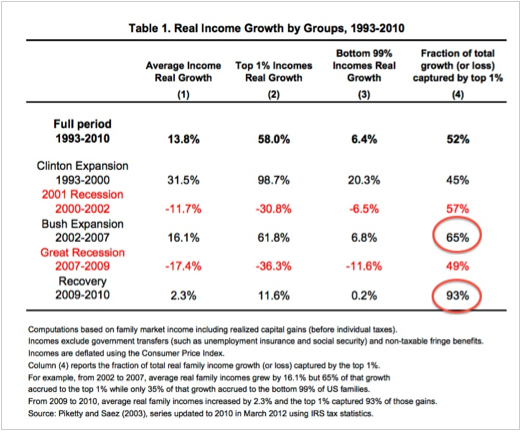As President Obama continues his distraction tour in an effort to take attention away from the ongoing Obamacare failure by focusing on "income inequality," it's important to remember Obama's record on the issue. Despite the President lamenting about how unfair and "unequal" the American economic system is, under his leadership, the gap between rich and poor has expanded to a disparity not seen since the Great Depression.
The gap in employment rates between America's highest- and lowest-income families has stretched to its widest levels since officials began tracking the data a decade ago, according to an analysis of government data conducted for The Associated Press.
Rates of unemployment for the lowest-income families — those earning less than $20,000 — have topped 21 percent, nearly matching the rate for all workers during the 1930s Great Depression.
U.S. households with income of more than $150,000 a year have an unemployment rate of 3.2 percent, a level traditionally defined as full employment. At the same time, middle-income workers are increasingly pushed into lower-wage jobs. Many of them in turn are displacing lower-skilled, low-income workers, who become unemployed or are forced to work fewer hours, the analysis shows.
"This was no 'equal opportunity' recession or an 'equal opportunity' recovery," said Andrew Sum, director of the Center for Labor Market Studies at Northeastern University. "One part of America is in depression, while another part is in full employment."
As Fox News' Bret Baier points out, President Obama's push for income equality is nothing new. Obama talked about the issue in his 2012 State of the Union address and you can bet he'll be talking about it next week during his 2013 speech.
In his 2012 State of the Union address, Obama said: "The defining issue of our time is how to keep that promise alive. No challenge is more urgent. No debate is more important. We can either settle for a country where a shrinking number of people do really well, while a growing number of Americans barely get by, or we can restore an economy where everyone gets a fair shot, and everyone does their fair share, and everyone plays by the same set of rules."And, gasp, even the Huffington Post understands Obama's failure to achieve results after making speeches about the issue of income inequality.
But a look back shows that income inequality has grown, not shrunk, under the current president.
"All told, income inequality has tended to get worse under President Obama," American Enterprise Institute President Arthur Brooks said.
President Obama may talk a big game about economic fairness, but his record on the issue doesn't quite match up.
There are lots of reasons to think so -- and we'll touch on several in just a minute -- but the most recent comes from Matt Stoller, blogging at Naked Capitalism, who points us toward a recent bit of number-crunching from Emmanuel Saez, a professor at the University of California, Berkeley.
Saez, who's known for his work on the income gap, has highlighted a surprising and discouraging fact: during the post-recession period of 2009 and 2010, the rich snagged a greater share of total income growth than they did during the boom years of 2002 to 2007.
In other words, inequality has been even more pronounced under Obama than it was under George W. Bush.

The bottom line? Big government policies don't provide economic opportunities for people to get ahead and government can't force the market into giving everyone the same level of income. American's get ahead by moving into a higher income bracket through the free market, not through government programs or handouts. Barack Obama's record shows he's more interested in giving speeches and making people feel like victims of an "unfair system" than supporting policies to get government out of the way so the economy, and its workers, can thrive again.
